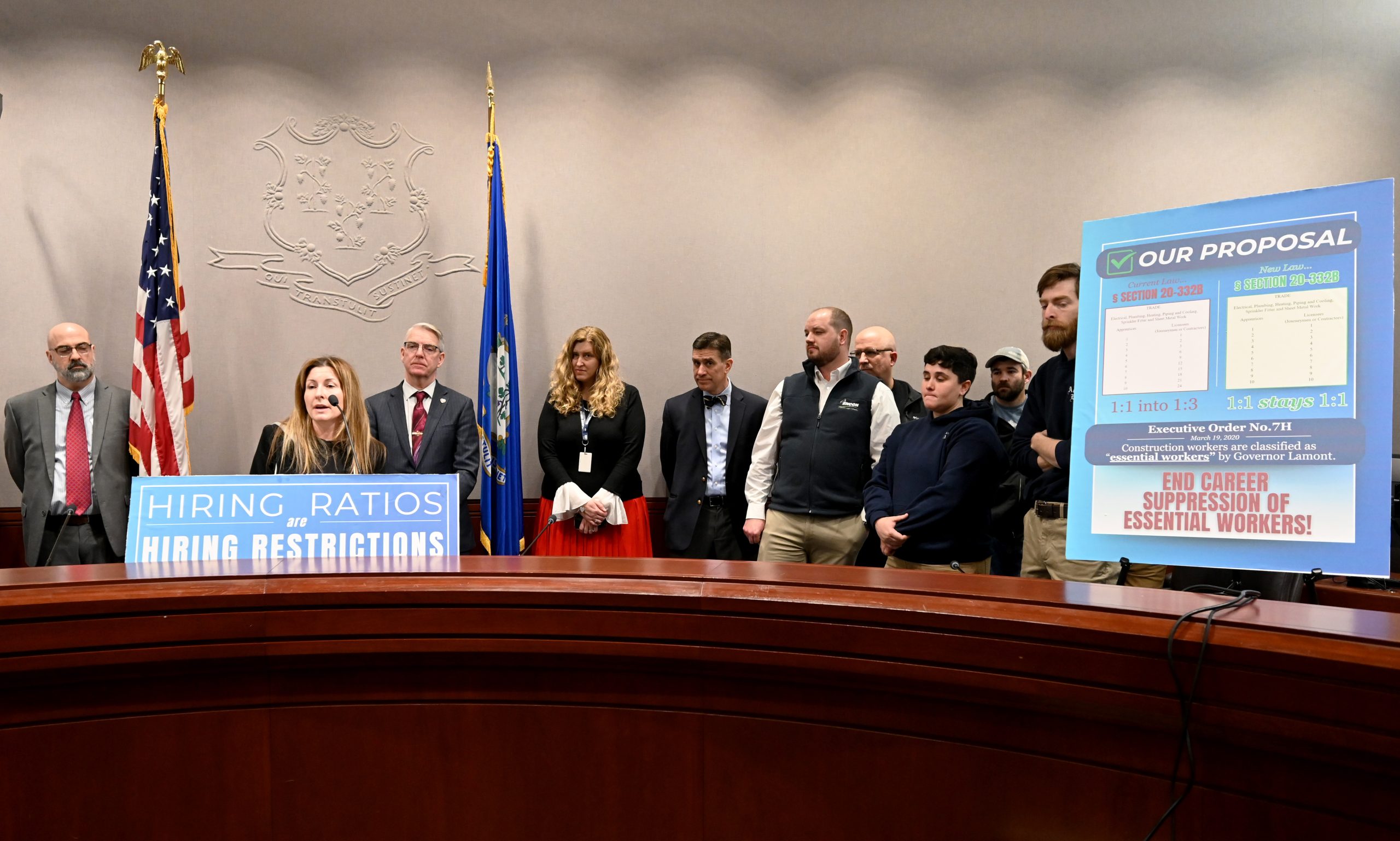Want to hire more apprentices? First change the ratio laws: An Interview

Posted on March 19, 2024
By Jim Perras, CEO HBRA of CT (originally published in the CT Builder, The Magazine of the Home Builders & Remodelers Assoc. of Connecticut)
The HBRA of CT is privileged to have Tim Ackert, owner of Ackert Electric, as one of its esteemed members. Not only does Tim boast a rich history as the proprietor of a small electrical company for many years, but he has also dedicated over three decades to teaching in the trades. In addition, Tim serves as a state representative, representing the 8th district, which encompasses the towns of Bolton, Columbia, Coventry, Lebanon, and Tolland. His commitment to Workforce Development in the licensed trades has earned him recognition as a leader by peers in the General Assembly, transcending party lines.
Connecticut is facing a housing crisis. There is not enough supply to meet demand. There are several contributing factors that the state legislature has attempted to grapple with in recent years like restrictive zoning, and affordable housing funding. By comparison the shrinking residential construction workforce has received little attention.
Connecticut finds itself with one of the oldest residential construction workforces in the nation. Connecticut never truly recovered its residential construction workforce after the great recession of 2009. Skilled labor within the industry was significantly diminished, with individuals either leaving for other states with better housing markets or shifting to different sectors altogether. For years, Tim Ackert has been a vocal advocate for sensible reforms to the journeyman to apprenticeship ratio laws.
These laws apply to five licensed trades in Connecticut, including electrical, plumbing, pipefitting, HVAC, and sheet metal workers. Connecticut mandates a 1 to 1 jobsite journeyman to apprentice ratio for these trades, prohibiting apprentices from working independently. Beyond the 1 to 1 jobsite ratio these five trades are also subject to a more onerous restriction that stipulates small businesses can simultaneously employ up to 3 apprentices if they have 3 licensed journeymen on staff.
Beyond the initial 3 journeymen, companies must hire three new journeymen for each new apprentice they hire. To put this into perspective, a company that employs 24 licensed journeymen can only employ and train 10 apprentices.
In stark contrast, neighboring Rhode Island boasts a 1 to 1 ratio, prompting Tim to seek similar legislation for Connecticut. Interestingly, Rhode Island policymakers are currently considering even more progressive laws to allow companies to hire 3 apprentices for every journeyman they employ.
Tim’s motivation to lead the charge for ratio reform stems from a compelling set of reasons. He said, as of January 2024, there are 11,367 registered licensed electricians in the state of Connecticut. Back in 2004 there were 11,882 licensed electricians.
In Connecticut, there are less licensed electricians today than there were twenty years ago. By comparison there are only 2,225 registered apprentices. Tim suggests that this glaring disparity between the number of registered apprentices and journeymen signifies a missed opportunity.
We have a stagnant workforce. Policymakers in Connecticut have lofty goals to increase housing production to address our state’s housing crisis. Leaders are contemplating drastic measures in just about every industry to address climate change. To even begin to consider addressing these challenges, we’ll need to grow and train our skilled labor pool by leaps and bounds, and that can’t happen without more apprentices.
One major roadblock to reform, as Tim bluntly puts it, is the opposition from trade unions. Despite being responsible for only 17% of the current number of apprentices in Connecticut (with open shops responsible for 87%), unions have heretofore hindered all efforts at reform in favor of restricting the supply of labor demand to keep their rates high and still remain competitive with open shops. Union opposition to reform, has kept many young adults in Connecticut from fulfilling careers in the licensed
trades, has artificially restricted economic growth, and is partially responsible for Connecticut’s current lack of housing.
A significant challenge for Tim has been mobilizing small business contractors to actively engage in the process of reform. He attributes this reluctance to a sense of ingrained apathy within the trade’s community, rooted in the belief that the status quo is unchangeable. However, the tide could finally be turning.
Recently, Tim hosted a successful and well attended press conference in collaboration with legislators from both sides of the aisle, the licensed trades, and the HBRA of CT calling for ratio
reform. The HBRA encourages all its members to stand with Rep. Tim Ackert and the licensed contractor community to urge local legislators to ACT NOW, and safeguard the future of the residential construction industry, by reforming the ratio laws, so the trades can begin in earnest to train the next generation of skilled labor.
For those interested in learning more, or getting involved, contact the HBRA of CT or Rep. Tim Ackert. Together, we can ensure a robust and sustainable workforce to meet the needs of Connecticut residents, now and in the future.
HBRA of CT (860) 500-7796
Rep. Tim Ackert (860) 240-8700